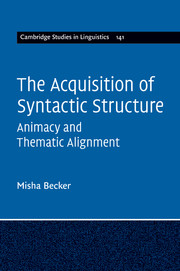Book contents
- Frontmatter
- Contents
- List of figures
- List of tables
- Acknowledgements
- 1 Introduction
- 2 The syntax of displacing and non-displacing predicates
- 3 Argument hierarchies
- 4 Animacy and adult sentence processing
- 5 Animacy and children's language
- 6 Modeling the acquisition of displacing predicates
- 7 Conclusion and origins
- Appendix
- Bibliography
- Index
3 - Argument hierarchies
Published online by Cambridge University Press: 05 July 2014
- Frontmatter
- Contents
- List of figures
- List of tables
- Acknowledgements
- 1 Introduction
- 2 The syntax of displacing and non-displacing predicates
- 3 Argument hierarchies
- 4 Animacy and adult sentence processing
- 5 Animacy and children's language
- 6 Modeling the acquisition of displacing predicates
- 7 Conclusion and origins
- Appendix
- Bibliography
- Index
Summary
In the preceding chapter I described the syntactic structures of four constructions whose predicates fail to select an external argument, or “semantic” subject. The syntactic subject these predicates do occur next to is therefore not thematically related to the main predicate in the usual way. In the language of derivational approaches to syntax, these subjects are derived, or displaced. In some of these constructions the displaced subject ends up in a position non-adjacent to the predicate that selected it (tough-movement and raising-to-subject); in the other constructions the displaced subject is still both string-adjacent to, and clause-mates with, its selecting predicate, but its grammatical role has changed, as it moves from an object position to a subject position (unaccusatives and passive).
The first three of these constructions can be contrasted with a construction that looks quite similar on the surface, but which does not involve the kind of argument displacement described above. In subject control constructions (irrespective of whether the predicate is a verb or an adjective), the syntactic subject is also the logical, or semantic subject of the main predicate. In unergative verb constructions the surface subject is an underlying subject, not an underlying object.
- Type
- Chapter
- Information
- The Acquisition of Syntactic StructureAnimacy and Thematic Alignment, pp. 61 - 125Publisher: Cambridge University PressPrint publication year: 2014



